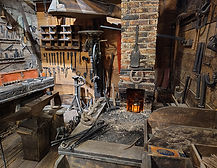AVENUE OF SHOPS
Step back in time with a stroll through the Avenue of Shops, complete with cedar block streets and wooden sidewalks.
The gallery represents stores and businesses in Alpena during the 1890s.

Henry Law Office
The Henry Law Office was established in 1898 by Charles R. Henry. Mr. Henry received his law degree at the University of Michigan, graduating in 1879. Prior to coming to Alpena, he distinguished himself as a state senator from the Huron Shore District. The law practice was very successful. Henry was named the attorney for the Detroit & Mackinac Railway Co. Mr. Henry's office was located in the Maltz block at the corner of Water Street and Second Avenue, next to the State Theater. The office was located upstairs in the building.
The Gebhardt-Morrow & C. Planing Mill
The Gebhardt-Morrow & Co. Planing Mill was established in 1873. It was one of the first and largest of its kind north of Bay City. The company was primarily concerned with custom milling, such as making window sashes, doors, moldings, etc. By 1892, the partners were Jacob Gebhardt, James L. Marrow, Louis Krimmer and James Murray. In 1900, the retail lumber business was introduced to the planing mill.

Baker Blacksmith Shop
Baker Blacksmith Shop was established in 1888. Thomas Adelore (Belanger) Baker was born January 26, 1864 in Quebec, Canada. He moved to Alpena in 1881. He apprenticed under August DeRush until he opened his own blacksmith shop in 1888, which operated over a half century. Thomas Baker’s blacksmith shop was located at 1017 Chisholm Street where the McDonald's restaurant now stands.
Hanover Harness Shop
Hanover Harness Shop was opened in Alpena by Daniel D. Hanover during the 1880s. His shop was located on the southwest corner of Second Avenue and Chisholm where the Royal Knight Cinema now stands. The Hanover Harness Shop performed all types of leatherwork, from making new harnesses and saddles to repairing leather goods.
Walter Scott's Cooper Shop
Walter Scott’s Cooper Shop and house were the only two buildings standing near the Thunder Bay River in the summer of 1853 when Mr. Fletcher and Mr. Daniel arrived in the region to hunt for pine lands. Mr. Scott was building barrels for the fishermen on Thunder Bay Island. Fishing was Alpena’s earliest industry. Barrels were built to ship the fish out of Thunder Bay to the lower port cities. In 1882, 1,932,000 pounds (that’s 966 tons) of fish were shipped from Alpena!

Barbershops
The Barbershop exhibit represents the typical small barbershop operating in the late 1890s. Barbers performed a variety of skills from cutting hair and shaving faces to pulling teeth and blood-letting. The practice of blood-letting gave rise to the barber pole symbol - the patient could grab a staff or pole during the procedure and the fluid would spin down and around the pole. The blood and the spiraling white bandage on the pole eventually became the symbol for all American barbershops.
1800's Music Shop
In the 1890s, a Music Shop owned by George Cobath was located on West Chisholm Street. On display here is a beautiful Brazilian Rosewood grand piano manufactured around 1870 by Lindeman & Sons of New York and brought to Alpena by the Kerr family. Also on display in the Music Shop is a carved organ made by Ferrand and Votey in the late 1890s.
Photography
A Photography Shop operated by Russell B. Emmons & Orton DeViney was located at 217 West Chisholm Street during the late 1890s. The photographer usually furnished the props such as a frilly parasol, a fan, walking stick, a toy, or an ornate chair.

General Store
The General Store was just about the most important business in a community. The official U.S. Post Office was usually located in the general store. The Long Rapids General Store on display is representative of the type of stores found in Northern Michigan communities. It was located in the village of Long Rapids and was built by the Marsten family.
Spen's Drug and Wallpaper Shop
Spen’s Drug and Wallpaper Shop sold drugs, paints, oils, and wallpaper. Early druggists dispensed all sorts of medicines, not only those they mixed themselves, but also manufactured “cure-alls,” such as Dr. Shoop’s sarsaparilla & iron tonic. Many of the items on display are from the original store owned by Edward C. Spens. It was located at 404 Dock Street which is now North Second Avenue. As late as 1987, Spens Drug Store, Inc. was still in business on the corner of Second Avenue and River Street.

